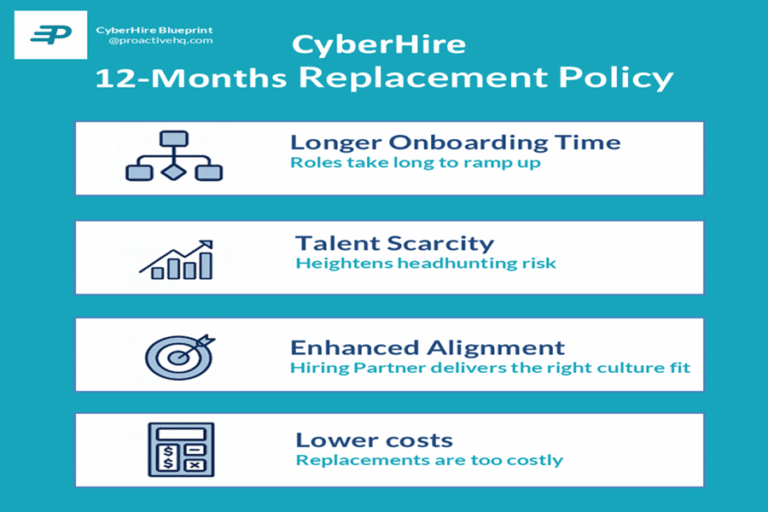
(Especially for Security Architects, Security Engineers, InfoSec Risk Analysts, & Cybersecurity Sales Roles)
Cybersecurity hiring is different.
You’re not just filling a vacancy — you’re protecting the organisation’s reputation, data, and bottom line.
Yet, too often, companies are left exposed when a newly hired cybersecurity professional leaves after just a few months. Attrition in cybersecurity is real: burnout, aggressive poaching, misalignment of expectations, and unclear role scope are common causes.
That’s why a 12-month replacement policy (in the unlikely event of attrition) isn’t a “nice to have.”
It’s a business imperative.
Here’s why:
1. Cybersecurity roles require longer onboarding and ramp-up time.
Cybersecurity isn’t plug-and-play.
A Security Architect or Engineer may need months to:
- Understand the infrastructure
- Map out vulnerabilities
- Build relationships with DevOps, IT, and leadership
- Implement controls aligned to frameworks (ISO 27001, NIST, etc.)
If they leave after three months, the organisation loses momentum and security maturity regresses.
A 12-month replacement policy protects that investment.
2. Talent scarcity increases salary wars and headhunting risk.
The demand for cybersecurity talent far exceeds supply.
Globally, millions of roles remain unfilled — and skilled professionals are constantly approached.
InfoSec Risk Analysts and Cybersecurity Sales professionals are especially targeted because:
- They sit close to business value
- They are customer-facing and revenue-impacting
A replacement policy reduces risk if they are pulled into another opportunity.
3. It forces the recruiter to truly understand the business — not just fill a seat.
A 12-month guarantee means:
- No shortcuts in sourcing
- No resume-sliding
- No “bodies in chairs”
Hiring partner must match not just capability, but culture, expectations, and personality.
For us, that means deep discovery:
- Threat landscape
- Budgets
- Internal maturity
- Current and future tech stack
- Success metrics and 30/60/90 expectations
Because when the role is properly defined and the candidate is accurately aligned, attrition drops to almost zero.
4. It creates accountability — where it usually doesn’t exist.
Most recruitment models reward speed, not accuracy.
A 12-month replacement policy flips that equation:
- The recruiter is accountable for long-term fit.
- The organisation isn’t left hanging if things change internally.
- The partnership becomes strategic — not transactional.
When a recruiter is responsible for retention, hiring becomes quality-first.
5. It reduces hidden costs of a bad hire.
Replacing a cybersecurity hire can cost 1.5x to 2x the salary when you factor:
- Lost productivity
- Project delays
- Risk exposure
- Re-recruitment cost
A replacement policy protects the business from unexpected expenses.
Bottom line: cybersecurity hiring is high-stakes.
A 12-month replacement policy gives leaders peace of mind and proves the recruiter has skin in the game.
If your hiring partner won’t guarantee retention, ask yourself:
Do they truly believe in the quality of their process?
Curious:
Would a 12-month replacement policy change the way you evaluate hiring partners?



